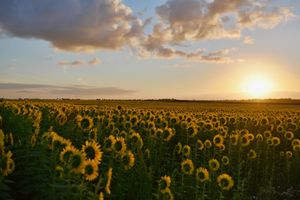Seeds of change: Why Ukambani farmers have turned to sunflowers

Emma Mweki, a sunflower farmer, displays sunflower oil in Kisooni, Machakos.
What you need to know:
- Serving the birds with small portions of the homemade feed, Ms Kongo notes, makes them add a lot of weight and lay many and huge eggs.
- This makes the chicken enterprise competitive.
On a sunny morning at the sleepy Makwenye Village in Kitui County, Pauline Kongo throws a handful of sunflower seeds to distract dozens of chicken milling around her as she prepares feed using a manual posho mill. She is soon overwhelmed.
“We start their day off with a bite of malaa,” she said, referring to the local name for flowers in general, which has now been appropriated for sunflowers. Ms Kongo runs a vibrant chicken enterprise which is hinged on sunflower, a cash crop taking the Ukambani region by storm.
With at least 600 indigenous chickens in her care at any one point, Ms Kongo’s enterprise turns heads in Kitui County and beyond. She has formed a habit of explaining at the earliest opportunity how she lost one of her hands in a 2007 road accident and how the setback inspired the setting up of the chicken enterprise. Seventeen years later, the mother of four who had slid into depression after the accident is surprised by how quickly she has bounced back. “Two years after I survived accident, I embraced commercial chicken production because I needed to be productive. I needed to cut dependence on others,” Ms Kongo tells Climate Action.
Apart from keeping the birds in clean coops and regular vaccination against diseases, Ms Kongo attributes the success of her enterprise to proper feeding using homemade feed. She is among tens of chicken farmers in the dry region who have turned to cowpeas, green gram, millets and, lately, sunflower, in the wake of frequent droughts and high cost of feed. They formulate their own chicken feed using local materials, which thrive even when the region receives little rainfall, after they were trained by agronomists on sustainable agriculture. Sunflower brings high levels of protein, fibre and essential minerals to the homemade feed.
Serving the birds with small portions of the homemade feed, Ms Kongo notes, makes them add a lot of weight and lay many and huge eggs. This makes the chicken enterprise competitive. An egg goes for Sh20 while a mature bird fetches at least Sh1,200. She sells the eggs and mature birds to individuals and traders at the farm gate before they find their way to dinner tables in Migwani Township, Kitui, Mwingi and Nairobi.
Ms Kongo sits at the centre of an aggressive campaign to promote sunflower production in Kitui County. Multiple government agencies and non-government agencies which promote the adoption of drought resistant crops enlist her to train farmers in organised groups on sunflower production and its use in formulating chicken feed.
Sunflowers take three months to mature. Farmers intercrop it with maize, beans and peas. “We have recently added sunflower in the list of the drought resistant crops which we recommend to farmers in semi-arid regions. We have been training smallholder farmers on how to formulate high-value chicken feed using a combination of sunflower, cowpeas, green grams and sorghum. The use of feeds made using locally available materials makes chicken ventures profitable,” said Francis Koma, the head of the National Drought Management Authority in Kitui County.
Apart from being a key raw material in feed production, sunflower is a source of edible oil. This is the main reason the government has embarked on promoting the oil crop. The bulk of the sunflower produced in Kitui, Machakos and Makueni counties goes into the production of edible oils as the craze for healthy eating sweeps across the region. Smallholder sunflower farmers make a beeline for cold press machines, which have mushroomed in the region, to squeeze oil at a fee. “By producing sunflower oil locally, I have managed to significantly lower our cost of living at home. The oil is healthy,” said Emma Mweki, a sunflower farmer at Muthetheni region in Machakos County.
A spot check by Climate Action has shown that owners of the sunflower cold press machines are forced to import sunflower from Ethiopia and Tanzania to sustain their businesses because local farmers are not producing enough raw materials. “On average, 100 kilos of sunflower seeds yield around 25 litres of cooking oil. Hybrid varieties produce more oil compared to the open pollinated varieties. The residue goes into making high value animal feed. Sunflower oil is on high demand in the market since it is said to be healthy,” said Meshack Mutevu, a pastor who operates a cold press for squeezing sunflower oil in Masii. He is among individuals who promote the production of sunflowers in Machakos County, which he believes holds the key to unlocking the economic potential of farmers in arid and semi arid regions.
Agriculture Cabinet Secretary Mithika Linturi last month distributed sunflower seedlings to farmers in Kitui and Makueni counties as he announced an all-out campaign mounted by the government to promote the oil crop across the country. Crops Development Principal Secretary Paul Rono said the government banks on sunflower production to reduce the amount of money it spends on importing edible oil. “The government spends Sh117 billion annually to import edible oil. We have distributed 70, 000 tonnes of sunflower seeds to farmers in 24 counties in a bid to reduce the amount of money the government uses to import edible oils,” he said recently. Kitui, Machakos and Makueni are among the counties targeted in the programme.




